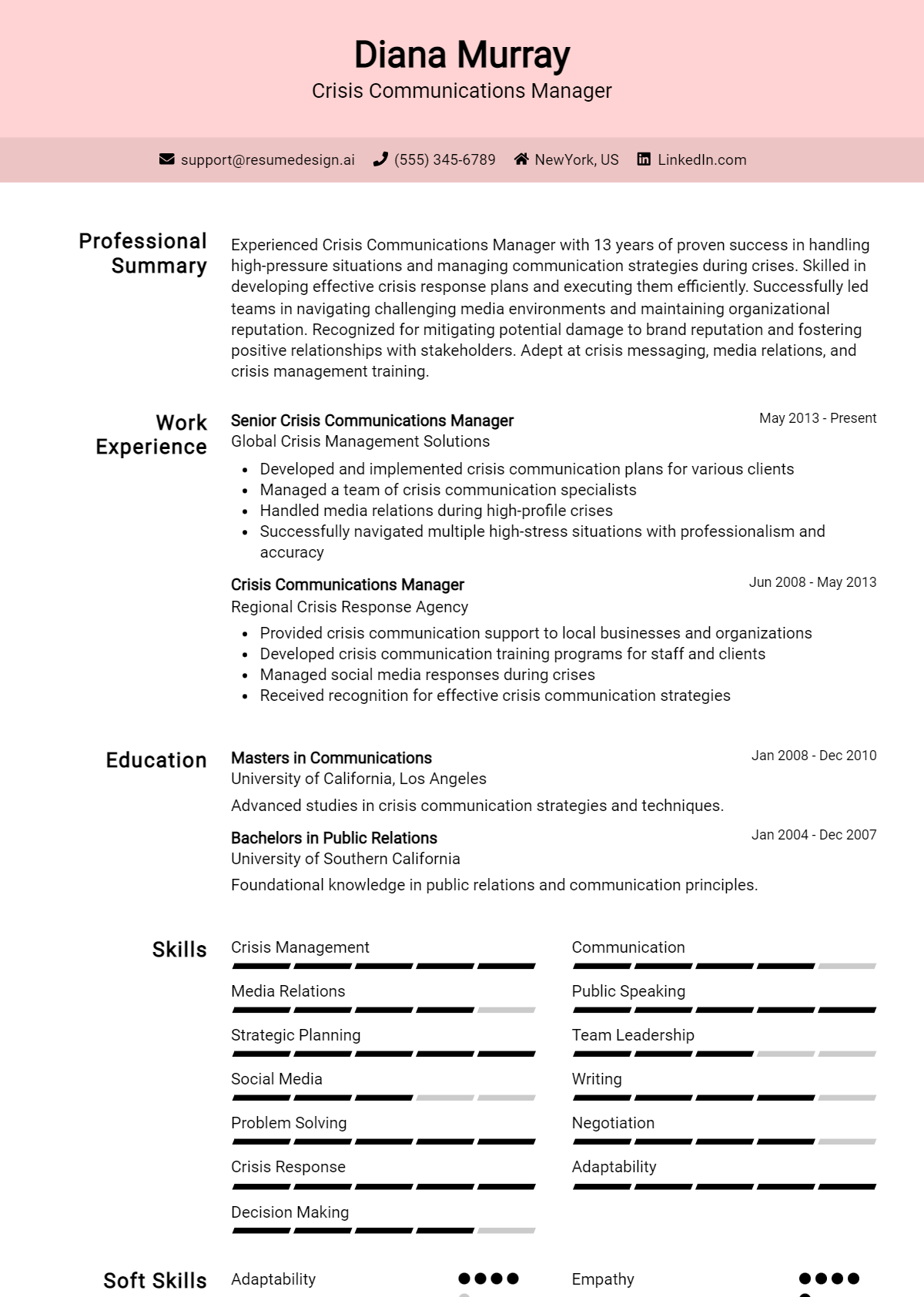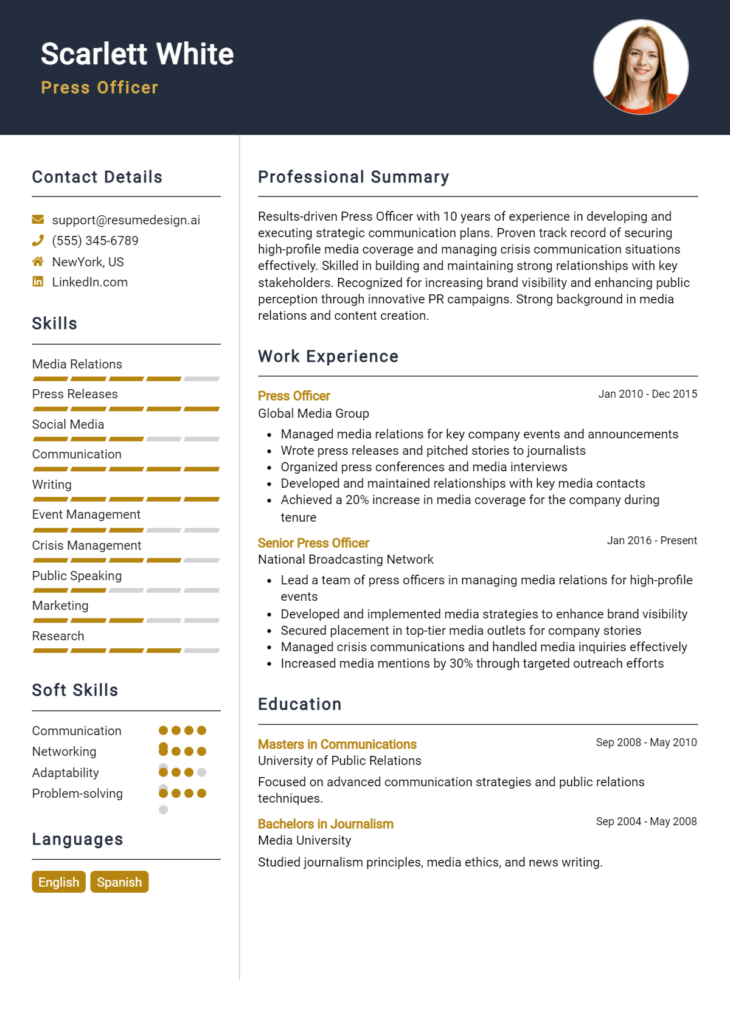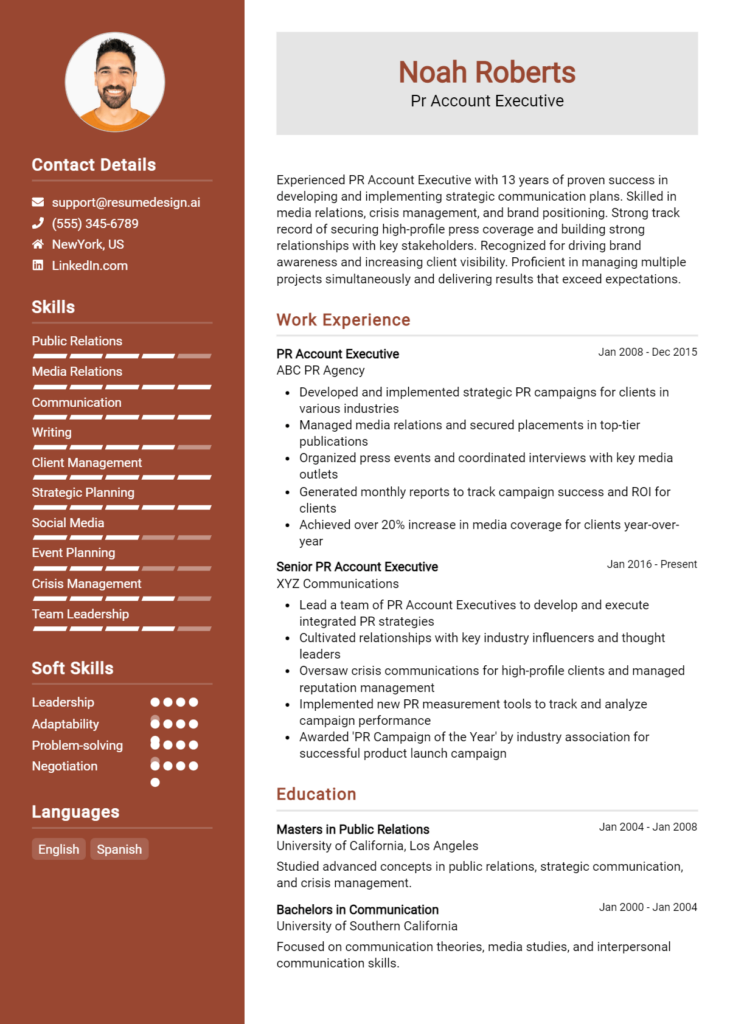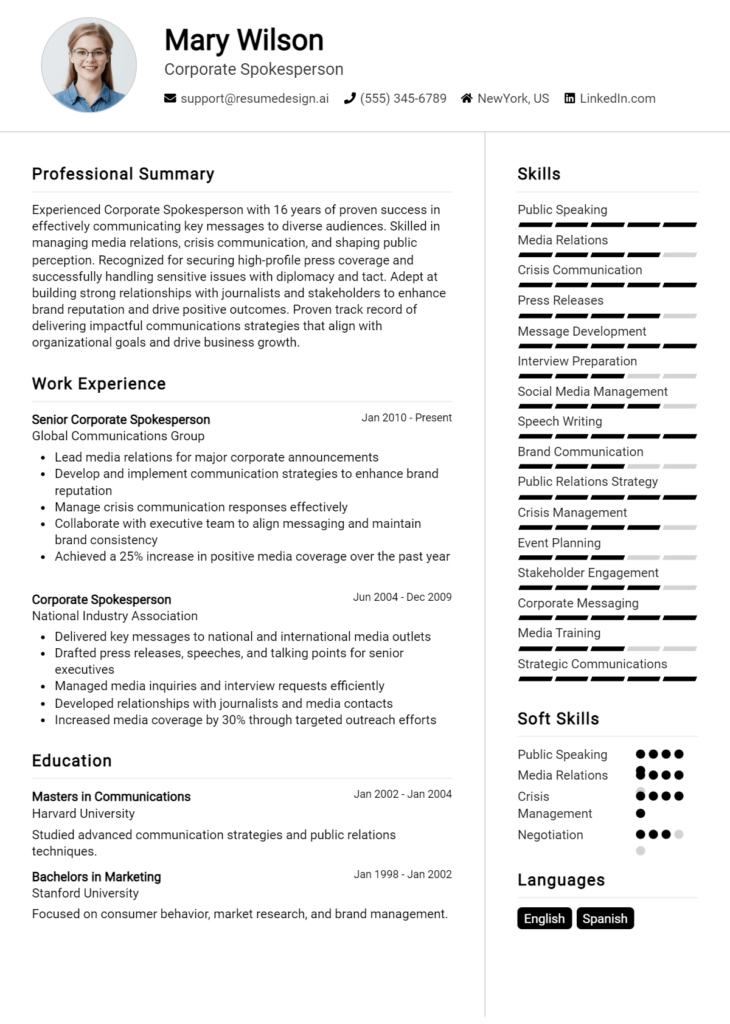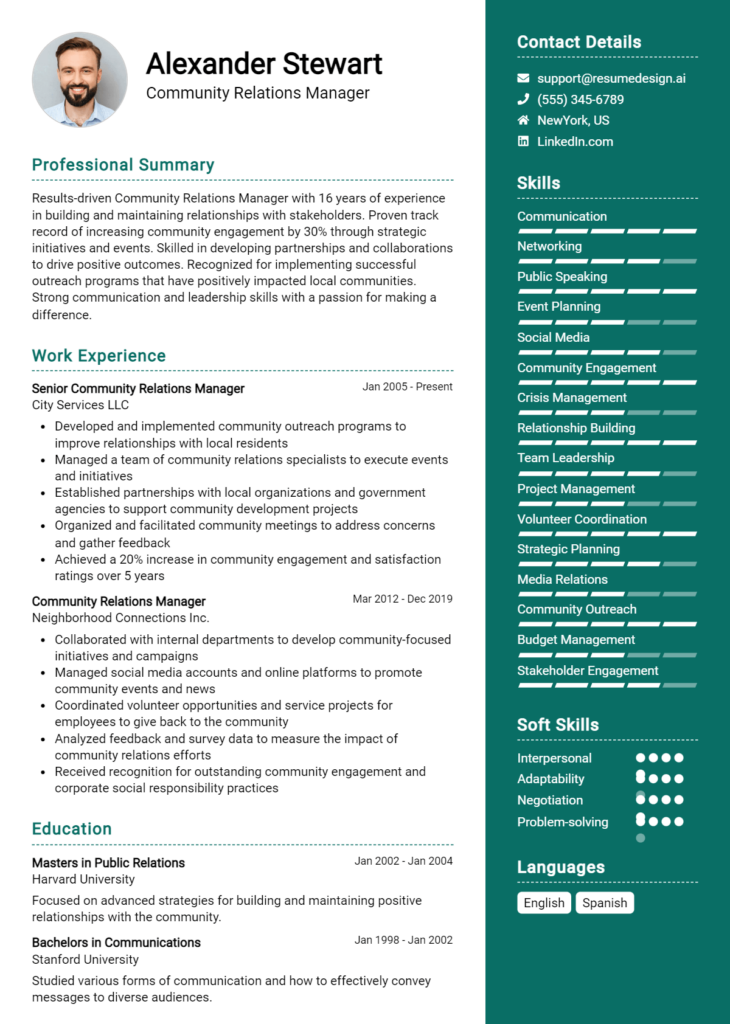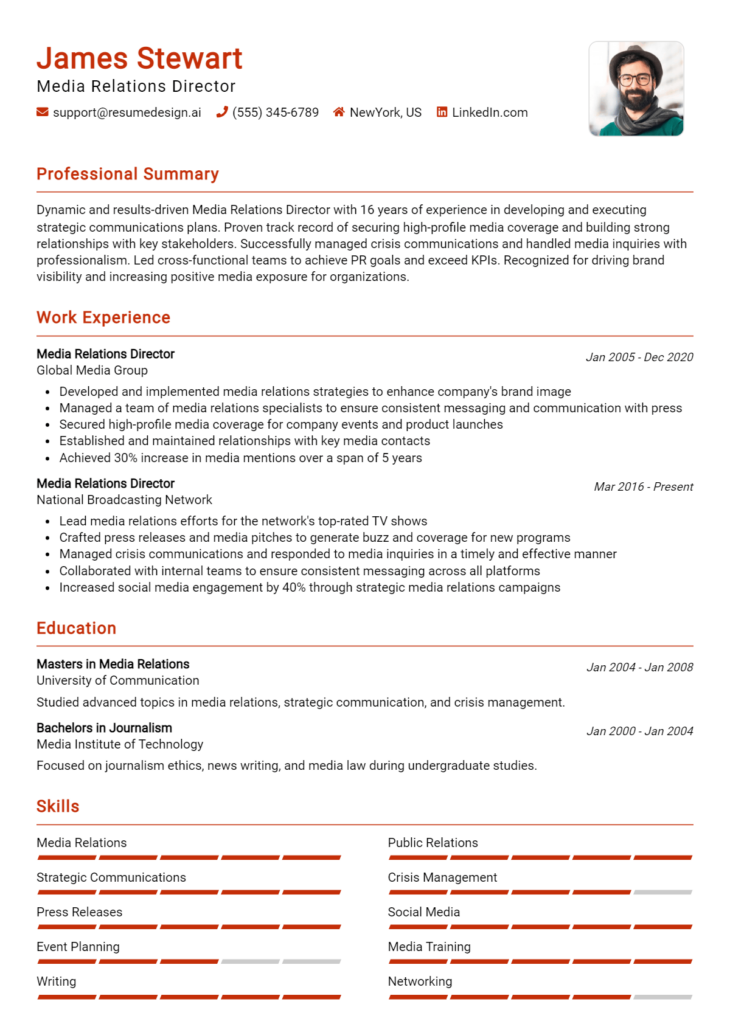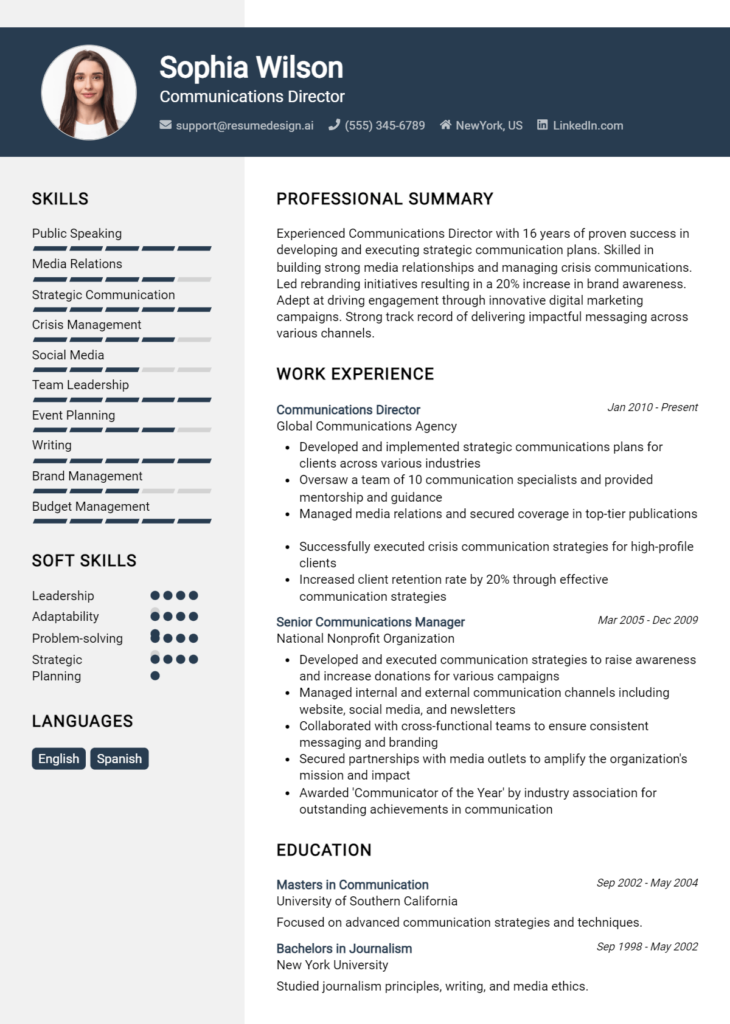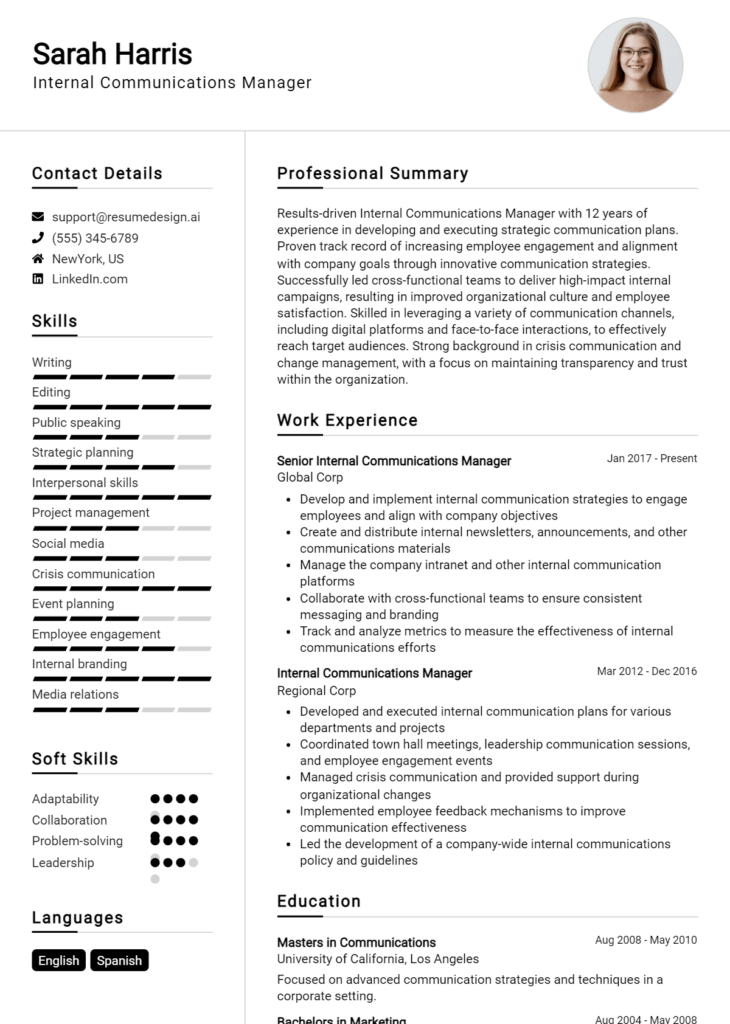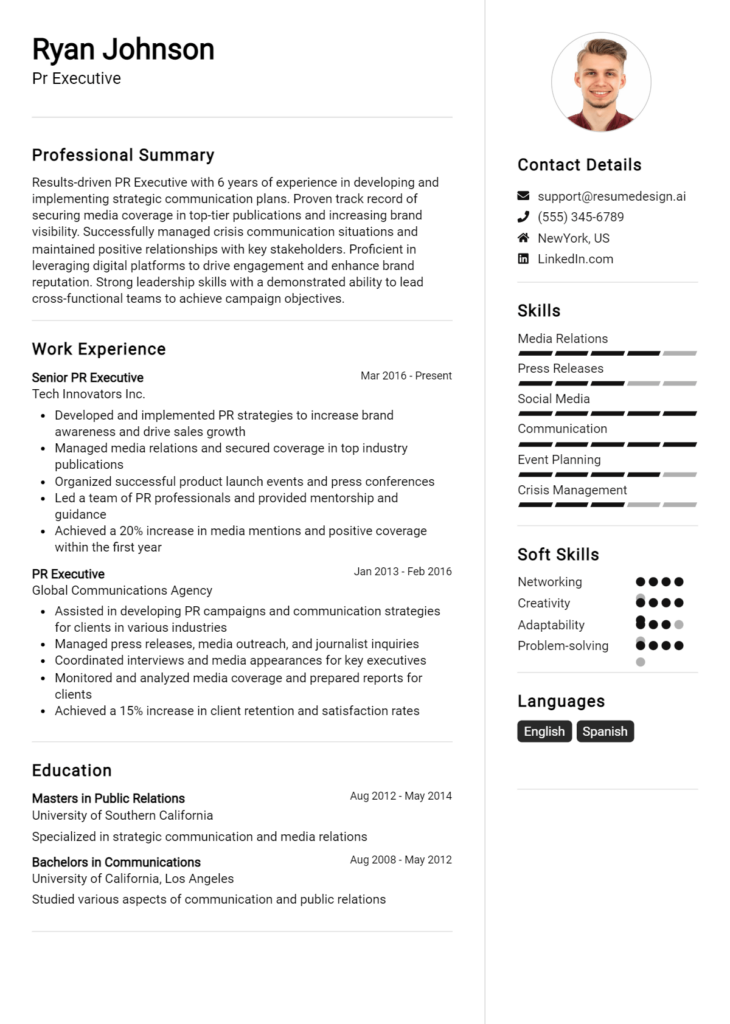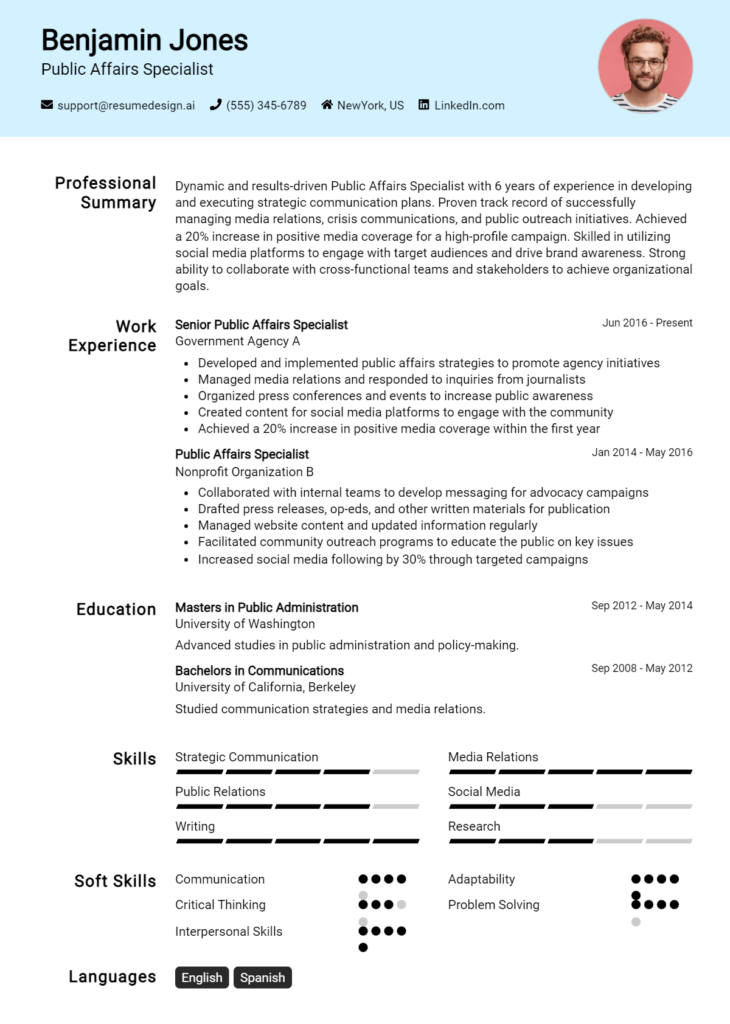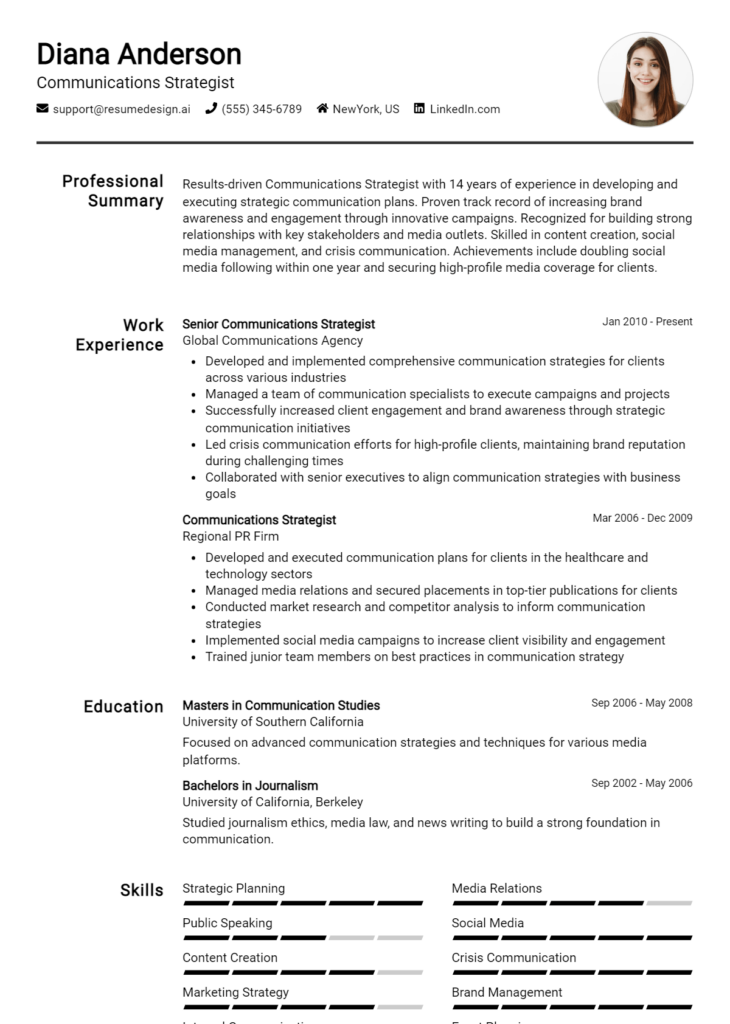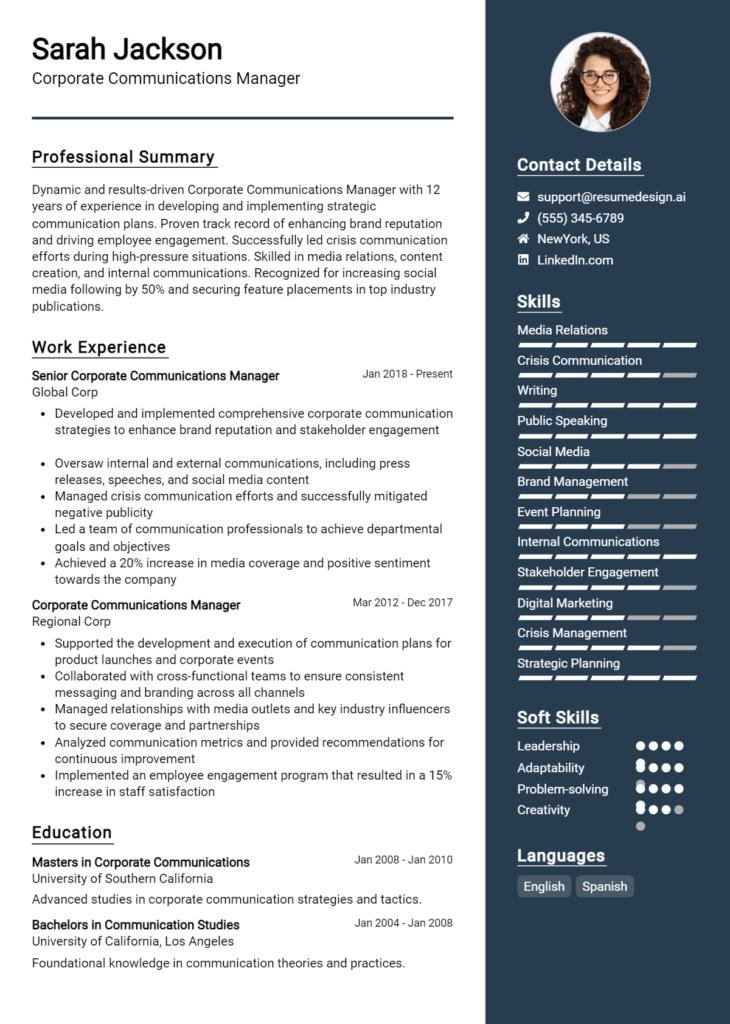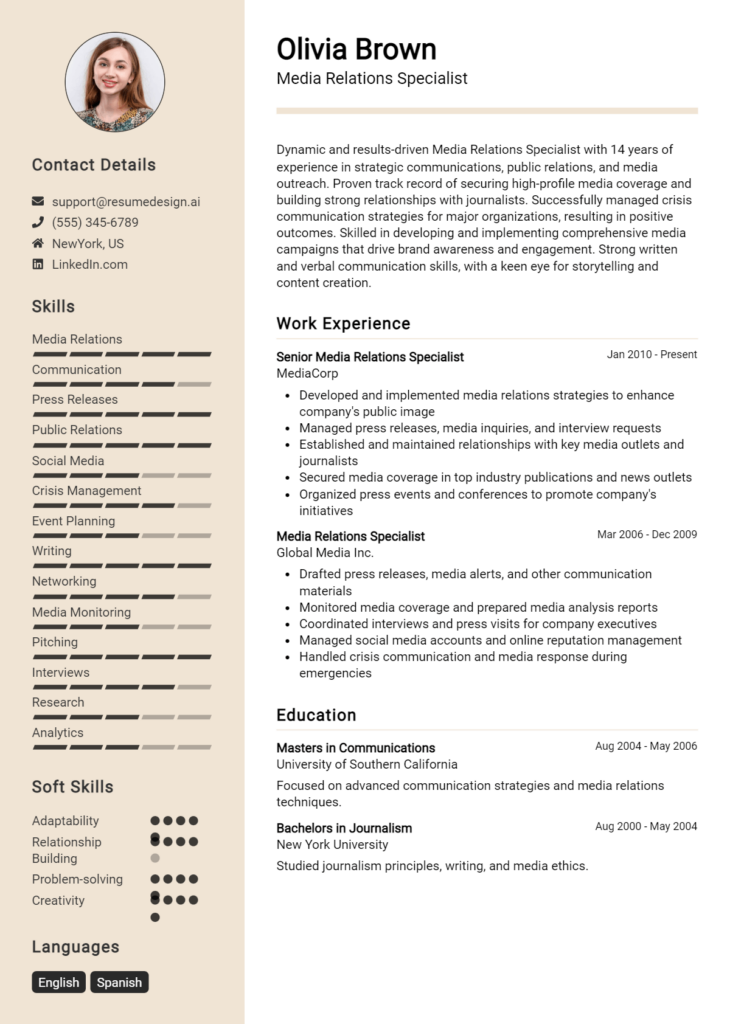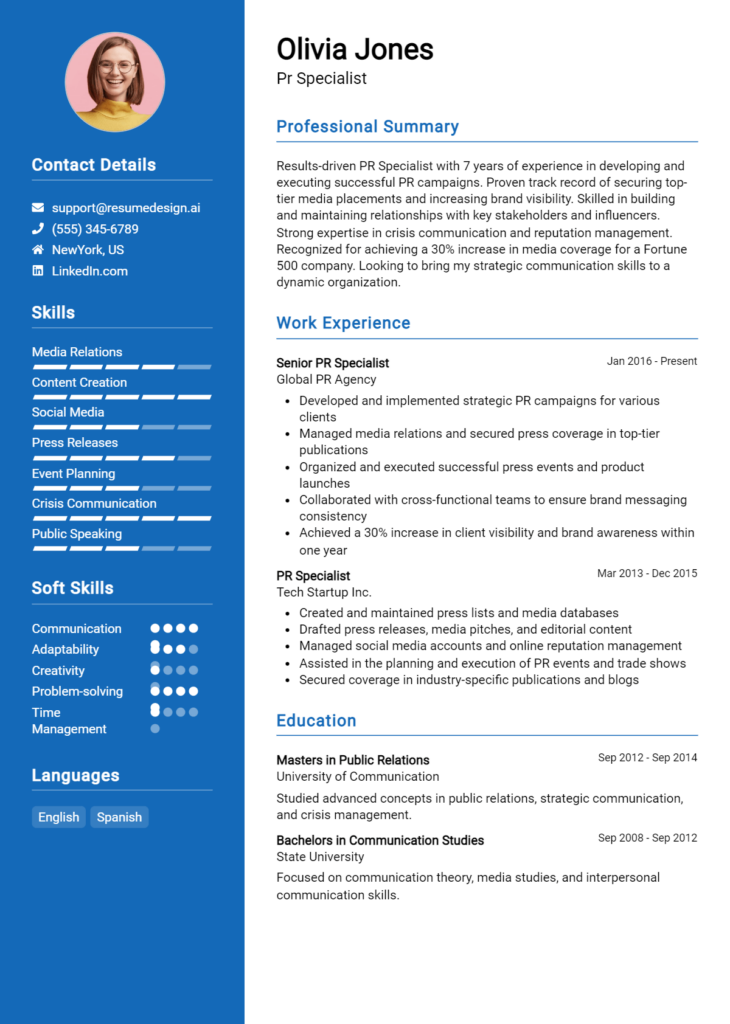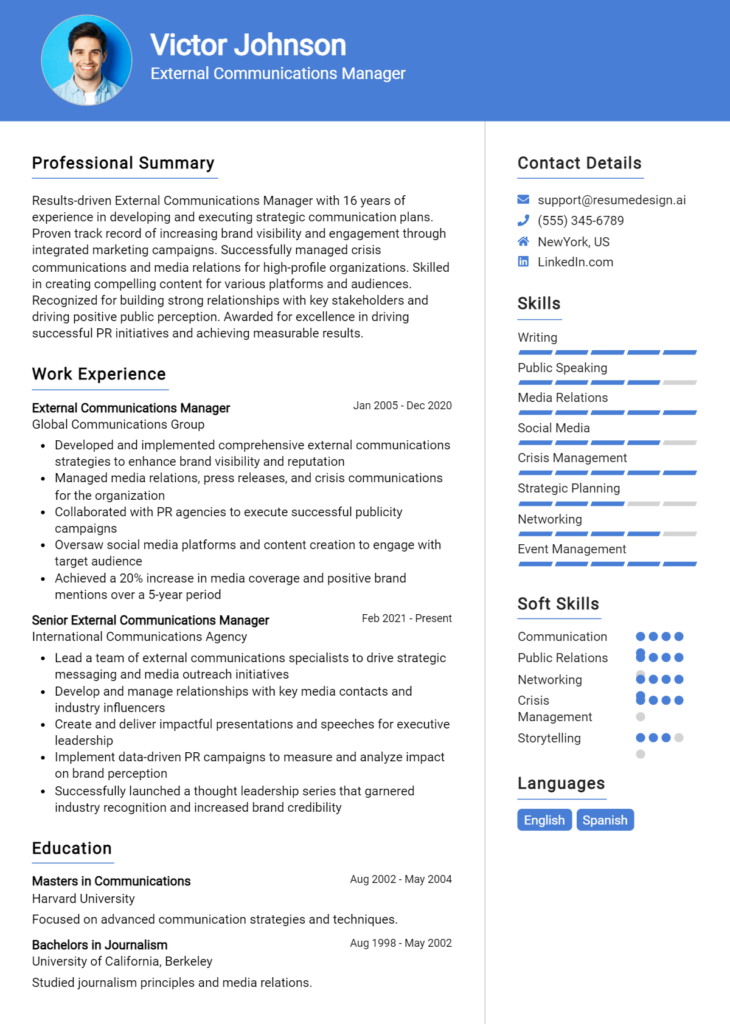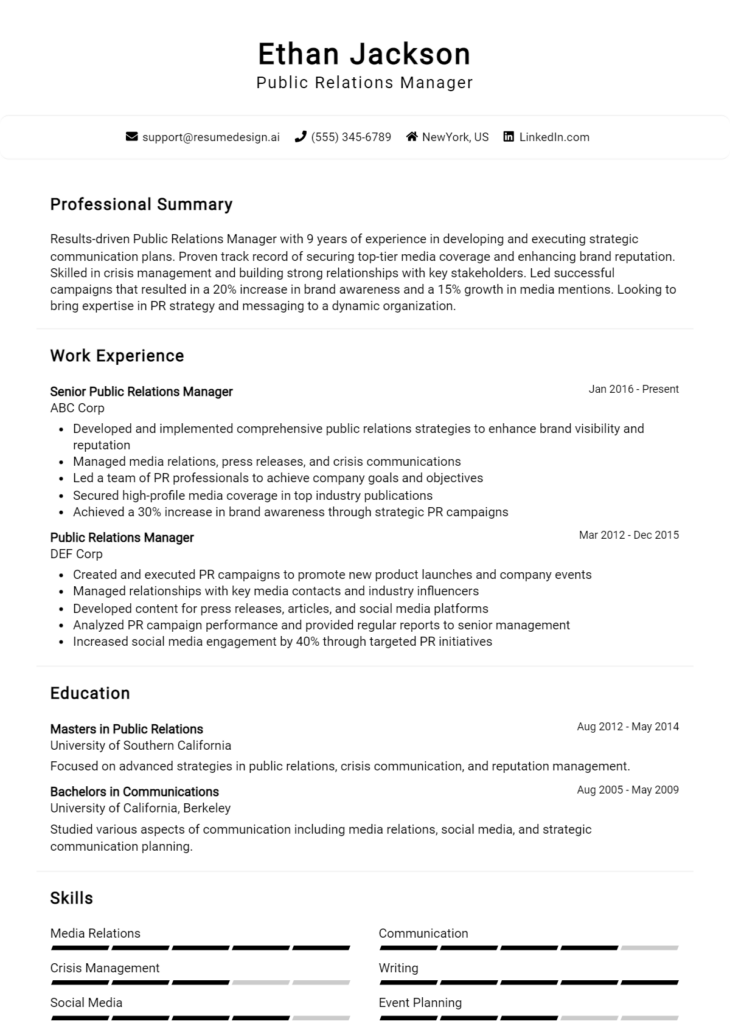Crisis Communications Manager Core Responsibilities
The Crisis Communications Manager plays a crucial role in safeguarding an organization's reputation during challenging times. Key responsibilities include developing communication strategies, coordinating with various departments, and managing media relations. This role requires strong technical skills, operational insight, and adept problem-solving abilities to navigate crises effectively. By fostering collaboration across functions, a Crisis Communications Manager aligns with the organization's overall goals. A well-structured resume can effectively highlight these qualifications, demonstrating the candidate's readiness to handle high-pressure situations.
Common Responsibilities Listed on Crisis Communications Manager Resume
- Developing and implementing crisis communication plans.
- Coordinating internal and external communication during crises.
- Monitoring media coverage and public sentiment.
- Training staff on crisis communication protocols.
- Collaborating with legal and compliance teams for messaging accuracy.
- Conducting risk assessments and scenario planning.
- Crafting press releases and media statements.
- Managing social media responses during crises.
- Building and maintaining relationships with key stakeholders.
- Evaluating the effectiveness of crisis communication efforts.
- Providing strategic counsel to leadership during crises.
- Staying informed about industry trends and best practices.
High-Level Resume Tips for Crisis Communications Manager Professionals
In the fast-paced world of crisis communications, a well-crafted resume is not just a representation of your professional journey; it's your first chance to make a lasting impression on potential employers. As the gatekeeper of your career, your resume must highlight both your skills and achievements in a way that resonates with hiring managers seeking capable Crisis Communications Managers. It serves as a critical tool that communicates your ability to manage sensitive situations effectively and your readiness to contribute to their organization. This guide will provide practical and actionable resume tips specifically tailored for Crisis Communications Manager professionals, ensuring you stand out in a competitive job market.
Top Resume Tips for Crisis Communications Manager Professionals
- Tailor your resume to the specific job description, emphasizing keywords that reflect the employer's requirements and responsibilities.
- Showcase relevant experience in crisis management, emphasizing roles where you played a key part in managing communications during critical situations.
- Quantify your achievements with metrics, such as the percentage of positive media coverage obtained during a crisis or the reduction in response time to incidents.
- Highlight industry-specific skills, such as media relations, stakeholder engagement, and risk assessment, to demonstrate your expertise in crisis communications.
- Incorporate examples of successful crisis communication strategies you developed or executed to illustrate your problem-solving abilities.
- Include any certifications or training specific to crisis management or communication, such as crisis communication workshops or public relations certifications.
- Utilize a clear and concise format, ensuring that your resume is easy to read and that key information stands out.
- Demonstrate your adaptability and ability to work under pressure, as these traits are essential in crisis situations.
- Use action verbs to convey your contributions effectively, making your accomplishments sound impactful and engaging.
- Consider including a summary statement that encapsulates your experience and strengths in crisis communications for immediate impact.
By implementing these tips, you can significantly enhance your chances of landing a job in the Crisis Communications Manager field. A compelling resume not only showcases your qualifications but also demonstrates your understanding of the role's demands, ultimately making you a more attractive candidate to potential employers.
Why Resume Headlines & Titles are Important for Crisis Communications Manager
In the fast-paced world of crisis management, a Crisis Communications Manager plays a pivotal role in shaping the narrative during challenging times. A well-crafted resume headline or title is crucial for professionals in this field as it serves as the first impression to hiring managers, encapsulating the candidate's core qualifications in a succinct and impactful manner. A strong headline can immediately capture attention, highlighting relevant expertise and experience while setting the tone for the rest of the resume. It should be concise, relevant, and directly aligned with the job being applied for, ensuring that the candidate stands out in a competitive job market.
Best Practices for Crafting Resume Headlines for Crisis Communications Manager
- Keep it concise: Aim for one impactful phrase that summarizes your qualifications.
- Make it role-specific: Tailor your headline to reflect the specific position you are applying for.
- Highlight key strengths: Focus on your most relevant skills, experiences, or accomplishments.
- Use action-oriented language: Choose strong verbs that convey your proactive approach to crisis management.
- Incorporate industry keywords: Use terms that are relevant to crisis communications to enhance visibility.
- Showcase measurable achievements: If possible, include quantifiable results to demonstrate impact.
- Avoid jargon: Use clear and straightforward language to ensure your message is easily understood.
- Be authentic: Ensure your headline reflects your true professional identity and career aspirations.
Example Resume Headlines for Crisis Communications Manager
Strong Resume Headlines
Dynamic Crisis Communications Manager with 10+ Years of Experience in High-Stakes Environments
Results-Driven Crisis Strategist Specializing in Media Relations and Stakeholder Engagement
Proven Leader in Crisis Management: Transforming Challenges into Opportunities for Growth
Weak Resume Headlines
Communications Manager
Experienced Professional Seeking New Opportunities
The strong headlines are effective because they clearly communicate the candidate's specific skills and experiences relevant to the role of a Crisis Communications Manager, making them memorable and compelling. They use actionable language and highlight measurable achievements, which resonate with hiring managers looking for qualified candidates. In contrast, the weak headlines lack specificity and fail to convey the candidate's unique value, making them easy to overlook in a sea of applicants. A generic title does not provide any insight into the candidate's qualifications or suitability for the role, significantly diminishing their impact.
Writing an Exceptional Crisis Communications Manager Resume Summary
A well-crafted resume summary is crucial for a Crisis Communications Manager, as it serves as a powerful introduction that captures the attention of hiring managers. In a field where effective communication during crises can significantly impact an organization's reputation, a strong summary highlights the candidate's key skills, relevant experience, and noteworthy accomplishments. This concise and impactful statement should be tailored specifically to the job being applied for, ensuring that it resonates with the employer’s needs and expectations. A compelling summary not only sets the tone for the rest of the resume but also establishes the candidate as a qualified and strategic thinker capable of navigating high-pressure situations.
Best Practices for Writing a Crisis Communications Manager Resume Summary
- Quantify Achievements: Use specific numbers or percentages to demonstrate your impact in previous roles.
- Focus on Key Skills: Highlight essential skills relevant to crisis communication, such as strategic planning, media relations, and stakeholder engagement.
- Tailor to the Job Description: Customize your summary to reflect the specific requirements and responsibilities outlined in the job posting.
- Use Strong Action Verbs: Begin sentences with powerful verbs to convey confidence and decisiveness.
- Keep it Concise: Limit your summary to 3-4 sentences to maintain clarity and focus.
- Showcase Relevant Experience: Mention industries or types of crises you have managed to establish credibility.
- Emphasize Soft Skills: Include communication skills, adaptability, and leadership qualities that are vital for managing crises.
- Maintain a Professional Tone: Ensure that the language used reflects professionalism and competence.
Example Crisis Communications Manager Resume Summaries
Strong Resume Summaries
Dynamic Crisis Communications Manager with over 8 years of experience in orchestrating strategic communication plans during high-stakes situations, resulting in a 40% reduction in negative media coverage. Proven track record of building relationships with key stakeholders and effectively managing internal and external communications during crises.
Results-driven communications professional with extensive experience in crisis management across the healthcare sector. Successfully led a team that developed a crisis response strategy that decreased patient complaints by 30% and improved stakeholder trust ratings by 25% within six months.
Accomplished Crisis Communications Manager with a robust background in corporate communications and public relations. Spearheaded a high-profile crisis response for a Fortune 500 company that mitigated potential reputational damage, ultimately preserving over $5 million in annual revenue.
Weak Resume Summaries
Experienced manager looking for a position in crisis communications. I have worked in various roles and have some skills that might be useful.
Crisis communications specialist with knowledge of handling crises. I have a background in communications and want to help companies improve their public relations.
The strong resume summaries are effective because they provide specific details about achievements, quantify results, and clearly outline relevant skills and experience. They are tailored to the role of a Crisis Communications Manager, demonstrating the candidate's capabilities in managing crises effectively. In contrast, the weak summaries are vague and lack measurable outcomes or specific relevance to crisis communication, making them less engaging and impactful for hiring managers.
Work Experience Section for Crisis Communications Manager Resume
The work experience section of a Crisis Communications Manager resume is crucial as it serves as a direct reflection of the candidate's technical skills, leadership capabilities, and the ability to deliver high-quality communication strategies during critical situations. This section allows candidates to showcase their practical experience in managing crises, leading teams, and executing communication plans effectively. By quantifying achievements and aligning their experiences with industry standards, candidates can provide tangible evidence of their expertise and demonstrate their readiness to handle high-pressure situations in a professional setting.
Best Practices for Crisis Communications Manager Work Experience
- Use specific metrics to quantify achievements, such as percentage increases in positive media coverage or reductions in response times.
- Highlight technical skills relevant to crisis management, including familiarity with communication tools, social media platforms, and analytical software.
- Emphasize collaborative efforts by detailing cross-departmental partnerships and stakeholder engagement during crises.
- Showcase leadership by mentioning team sizes managed and successful mentorship or training initiatives implemented.
- Focus on outcomes rather than tasks; specify how your actions led to improved company reputation or risk mitigation.
- Align your experiences with industry standards and best practices to demonstrate your knowledge of the field.
- Incorporate relevant certifications or training that enhance your qualifications in crisis communication.
- Use action-oriented language to convey a sense of urgency and effectiveness in your achievements.
Example Work Experiences for Crisis Communications Manager
Strong Experiences
- Developed and implemented a crisis communication strategy that resulted in a 50% reduction in negative media coverage during a corporate scandal.
- Led a cross-functional team of 10 during a major product recall, ensuring timely communication to stakeholders and achieving an 85% customer satisfaction rating post-crisis.
- Executed a social media response plan that increased positive engagement by 70% during a public relations crisis, effectively turning the narrative in favor of the company.
- Managed a crisis simulation training for 50 employees, improving overall preparedness and response times by 40%, as measured in subsequent drills.
Weak Experiences
- Involved in communication during a crisis.
- Helped the team with some press releases related to crises.
- Participated in meetings about crisis management strategies.
- Worked on various projects, including some related to crisis situations.
The examples provided illustrate the distinction between strong and weak experiences. Strong experiences are characterized by specific, quantifiable outcomes that demonstrate effective leadership, technical expertise, and successful collaboration in crisis situations. In contrast, weak experiences lack detail and clarity, failing to convey the candidate's impact or contributions meaningfully. This highlights the importance of articulating experiences in a way that emphasizes results and showcases a proactive approach to crisis management.
Education and Certifications Section for Crisis Communications Manager Resume
The education and certifications section of a Crisis Communications Manager resume is essential in establishing the candidate's qualifications and expertise in the field. This section provides a comprehensive overview of the academic background that supports the candidate's understanding of communication theories and strategies, as well as any industry-relevant certifications that underscore their professional development. Highlighting relevant coursework, specialized training, and ongoing education efforts not only enhances the candidate’s credibility but also demonstrates their commitment to staying current in a rapidly evolving field. A well-crafted education and certifications section can greatly align the candidate's skills with the specific demands of the Crisis Communications Manager role, making them a more attractive candidate to potential employers.
Best Practices for Crisis Communications Manager Education and Certifications
- List degrees and certifications in reverse chronological order to highlight the most recent qualifications first.
- Include relevant coursework that directly pertains to crisis management, communication strategies, or public relations.
- Showcase any advanced degrees (e.g., Master's in Communication or Public Relations) to demonstrate higher-level expertise.
- Incorporate industry-recognized certifications such as the Accreditation in Public Relations (APR) or Crisis Communication Certification.
- Detail any specialized training programs, workshops, or seminars relevant to crisis communications.
- Include GPA if it is particularly strong, especially for recent graduates, to showcase academic excellence.
- Highlight any ongoing education efforts, such as online courses or webinars, to illustrate a commitment to continuous learning.
- Be concise and specific to maintain clarity and focus on the most impactful qualifications.
Example Education and Certifications for Crisis Communications Manager
Strong Examples
- M.A. in Strategic Communication, University of XYZ, 2021
- Accreditation in Public Relations (APR), Public Relations Society of America, 2022
- Certification in Crisis Communication Management, International Association of Business Communicators, 2023
- Relevant Coursework: Crisis Management Strategies, Public Relations Ethics, and Risk Communication.
Weak Examples
- B.A. in History, University of ABC, 2015
- Certification in Social Media Marketing, 2019
- Online Course in Creative Writing, 2022
- High School Diploma, XYZ High School, 2010
The examples provided illustrate the distinction between strong and weak educational qualifications and certifications for a Crisis Communications Manager. Strong examples are directly relevant to the field, showcasing advanced knowledge and specialized skills that align with the demands of crisis communication. In contrast, weak examples highlight qualifications that lack relevance to the role or do not demonstrate the necessary level of expertise, thereby reducing the candidate's competitiveness in the job market.
Top Skills & Keywords for Crisis Communications Manager Resume
As a Crisis Communications Manager, possessing the right skills is critical to navigating high-pressure situations effectively. This role demands not only a deep understanding of communication strategies but also the ability to manage public perception and maintain trust during challenging times. A well-crafted resume that highlights specific skills can make a significant difference in showcasing a candidate's qualifications. By focusing on essential hard and soft skills, a Crisis Communications Manager can demonstrate their readiness to handle crises, ensuring that organizations remain resilient and responsive. For more information on essential skills, refer to this guide on skills.
Top Hard & Soft Skills for Crisis Communications Manager
Soft Skills
- Exceptional verbal and written communication
- Strong leadership and team management
- Critical thinking and problem-solving
- Emotional intelligence and empathy
- Adaptability and flexibility
- Active listening skills
- Stakeholder engagement and relationship building
- Conflict resolution and negotiation
- Time management and prioritization
- Crisis management and response
Hard Skills
- Media relations and press release writing
- Social media strategy and management
- Risk assessment and crisis planning
- Data analysis and reporting
- Knowledge of public relations principles
- Familiarity with communication technologies
- Brand management and reputation monitoring
- Research and information gathering
- Content creation for various platforms
- Legal and ethical compliance in communications
A comprehensive understanding of these skills can enhance a Crisis Communications Manager's ability to develop effective strategies and execute them under pressure. To further strengthen your resume, consider detailing relevant work experience that showcases your application of these skills in real-world scenarios.
Stand Out with a Winning Crisis Communications Manager Cover Letter
Dear [Hiring Manager's Name],
I am writing to express my interest in the Crisis Communications Manager position at [Company Name]. With over [X years] of experience in strategic communication and crisis management, I have honed my ability to navigate complex situations and deliver clear, concise messaging to various stakeholders. My background in public relations, combined with my commitment to maintaining a positive organizational reputation, positions me uniquely to contribute effectively to your team.
In my previous role at [Previous Company Name], I successfully managed several high-stakes crisis situations, including [briefly mention a relevant crisis situation]. By developing tailored communication strategies and collaborating with cross-functional teams, I was able to mitigate damage and restore public trust in the brand. My proactive approach involved anticipating potential issues and preparing comprehensive response plans, which not only minimized negative media coverage but also strengthened our relationships with key audiences.
I am particularly impressed by [specific quality or project of the company], and I am eager to bring my expertise in crisis communication to [Company Name]. I thrive in fast-paced environments and understand the importance of crafting messages that resonate with diverse audiences during challenging times. My ability to remain calm under pressure and my strong analytical skills allow me to assess situations quickly and make informed decisions that safeguard the organization's reputation.
Thank you for considering my application. I am enthusiastic about the opportunity to contribute to [Company Name] as a Crisis Communications Manager and am looking forward to the possibility of discussing how my skills and experiences align with your needs. Please feel free to contact me at [Your Phone Number] or [Your Email Address] to schedule a conversation.
Sincerely,
[Your Name]
Common Mistakes to Avoid in a Crisis Communications Manager Resume
When crafting a resume for a Crisis Communications Manager position, it's crucial to present your skills and experiences in a manner that effectively highlights your qualifications. However, many candidates make common mistakes that can undermine their chances of standing out in a competitive job market. Avoiding these pitfalls can significantly enhance the impact of your resume and better showcase your ability to handle high-pressure communication scenarios.
Lack of Specific Examples: Failing to include concrete examples of past crises you've managed can leave hiring managers questioning your experience. Use quantifiable results to demonstrate your effectiveness.
Overly General Descriptions: Using vague language to describe your responsibilities can make it difficult for employers to gauge your expertise. Be specific about your roles and achievements in crisis situations.
Ignoring Relevant Skills: Not highlighting essential skills such as strategic communication, media relations, and stakeholder engagement can be detrimental. Tailor your skills section to reflect those most relevant to crisis management.
Neglecting Tailoring for Each Application: Sending out a generic resume without customizing it for each position can signal a lack of interest. Research the organization and align your resume with their values and needs.
Inadequate Focus on Results: Omitting the results of your crisis communication efforts can weaken your resume. Always include how your actions led to positive outcomes for the organization.
Poor Formatting: A cluttered or unprofessional layout can distract from your qualifications. Ensure your resume is cleanly formatted, easy to read, and visually appealing to make a strong first impression.
Failing to Include Online Presence: In today's digital age, neglecting to mention your professional online profiles or relevant publications can be a missed opportunity. Include links to your LinkedIn profile or articles you've written related to crisis communication.
Ignoring Soft Skills: While technical skills are important, crisis management also requires strong interpersonal abilities. Failing to highlight qualities like empathy, adaptability, and teamwork can leave a gap in your portrayal of a well-rounded candidate.
Conclusion
As a Crisis Communications Manager, you play a critical role in navigating and mitigating the effects of unexpected events on an organization’s reputation. This position requires a blend of strategic thinking, exceptional communication skills, and the ability to remain calm under pressure. Key responsibilities include developing crisis communication plans, coordinating with stakeholders, and managing media relations to ensure clear and accurate information dissemination.
In addition to these core functions, it is essential to continuously assess and refine your crisis communication strategies, leveraging data and feedback to improve future responses. Staying informed about emerging trends in crisis management and communication technologies can also enhance your effectiveness in this role.
With the increasing complexity of media and public perception, having a compelling resume that highlights your relevant skills and experiences is crucial for standing out in the job market. Now is the perfect time to review and update your Crisis Communications Manager resume to ensure it accurately reflects your capabilities and accomplishments.
We encourage you to explore a variety of resources available to aid in this process. Check out resume templates to find a design that suits your professional style. You can also use the resume builder for a user-friendly experience in creating a polished resume. For inspiration, browse through resume examples tailored to communications roles. Additionally, don’t overlook the importance of a strong cover letter; consider using our cover letter templates to craft a compelling introduction to your application.
Take action today by revamping your resume and enhancing your chances of landing your next opportunity as a Crisis Communications Manager!

